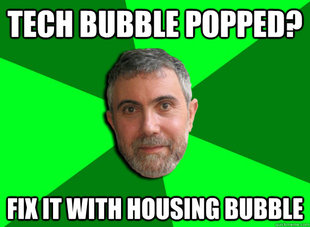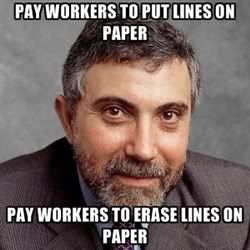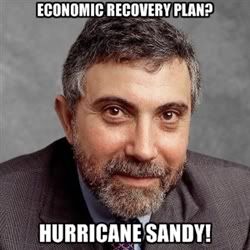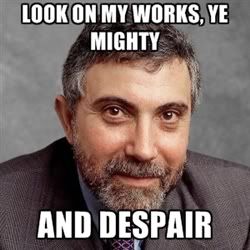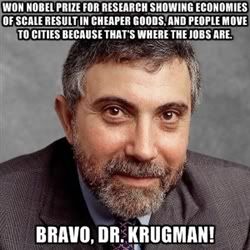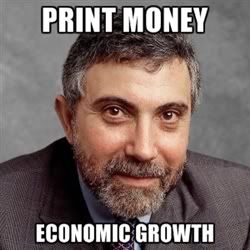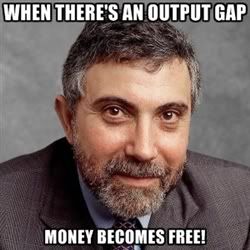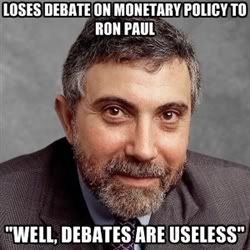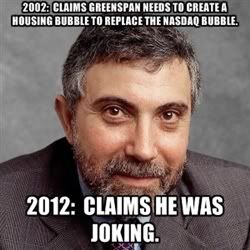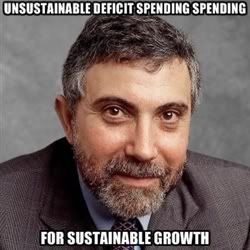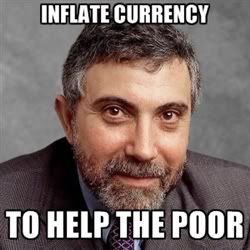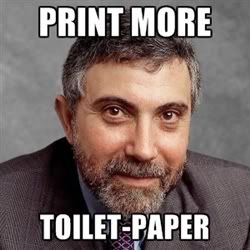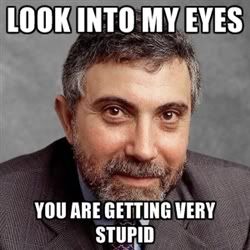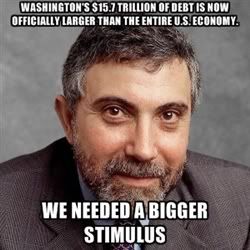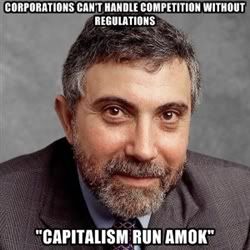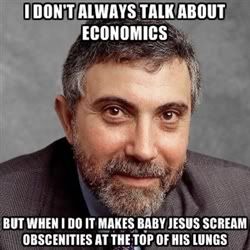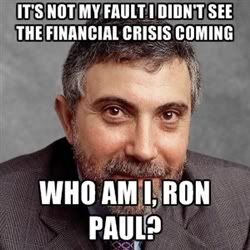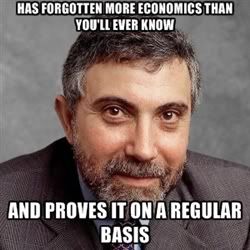To be fair Krugman hasn't been the brightest bulb around either. His keynesianism is a fix for an intrinsically broken system. But as Keynes said on the long run we're all dead anyway. That's why the people in power are always looking for a quick patch first and foremost. Greenspan did indeed patch over the 2001 recession with a housing bubble. Krugman proposes that this recession be patched over by increasing public spending.
It's not that simple, though: the comparison most often made is with the Great Depression but it
did not really work during the great depression. It only patched things over between 1933-40. Then WW2, much higher spending and (this is tremendously important!)
much higher taxes and price and trade restrictions finally solved the chronic problems of unemployment and underuse of capital equipment. You know why there is still no agreement on what ended the Great Depression? Because it was chance, not some rational strategy. The rational, deliberate, technical strategies - manipulating currencies, manipulation the price of gold, increasing public spending - either failed spectacularly or just contained the situation of the bad level it had arrived at. It was the forced savings of the wartime period (rationing) that ultimately "recapitalized" the lower class; the price controls of the wartime that limited the profits/rents and thus broke the accumulation tendency of the wealthy class. It was the taxes that were raised and remained high (and very progressive) after the war that made the reduction of accumulated wartime state debts a tool of wealth redistribution. The legacy of this lasted until the 1970s/80s, when such redistribution was gradually abandoned. The results of that inversion were not immediate, but they're arrived!
It's not enough for the state to spend, resolving a worldwide Depression in a capitalist system requires a redistribution of wealth. That means the state must also collect, and collect essentially from the wealthy. And to do
that capitalism must be at least temporarily "suspended". The reason why this is so is easy to understand: capitalism's driving force is the accumulation of wealth. More accurately, the concentration of wealth. The tenets of capitalist management call not for an increase of the "overall pie of wealth" and with it a company's profits; but for an increase in
the relative share of the pie captured by the company. The current expression "outperforming the market" betrays this mind frame, but the thinking was always so. The "austrian economists" (Schumpeter and all) actually expressed this better than the other schools, but they all implicitly admit it. Thus his "creative destruction": for some "entrepreneur" to accumulate, someone else must go bust in the same
relative degree. The austrian's solution is for businesses (and their owners) to go bust periodically. The problem is that this has the unfortunate tendency to be neither swift not painless to the employees...
What happens in the
Expansion years of the economy? The value of the assets held by the "entrepreneurs" expands, motivating reinvestment of their profits/rents. Everyone seems to be better of. In reality the relative improvement of the position of these entrepreneurs means that they're getting a larger share of the pie
by value, though not
by consumption. Think house prices going up while everyone who wants to buy one can so so by taking a bank loan. Wealth is getting concentrated, but consumption is still widespread. Same model for stock prices or indeed the value of any other fixed asset. Everyone is happy... until some event causes "confidence" to fall restricting trades of assets between the (now more) wealthy entrepreneurs. Then the prices of those things plummet.
Materially they could just write off losses and carry on, they still own the capital goods, it's just that they're nominally worth less. But capitalism's rules, accounting rules, social prestige and precedence rules, don't "allow" that: acknowledging losses would be a loss of face, or influence. To some who speculated too much and took too many risks, complete ruin. So you get a Depression. Funny how simple the whole thing really is. The reason why the more orthodox political speech and economic theory makes it look complicated is because the ruling classes, who always happen to be the people with their hands of the big portions of the pie, don't want the critical issue to be highlighted: the
accumulation of wealth. Because once that is recognized the fix becomes obvious: confiscate and redistribute a major portion of that wealth, by whatever means (inflation, taxation or indeed outright confiscation). Which, were it done equitatively, might not even impact greatly on their consumption and lifestyle, but makes them
individually fear for their social standing...

So we get the servants of the
status quo, like Keynes in the 1930s and Krugman now, prescribing either monetarist recipes
that exclude inflation (the tradition up to the Great Depression, and later in the 80s); or keynesian policies that simply seek to create yet another debt bubble (the ultimate bubble), new state debt to "restart" the economy. This did not work during the Great Depression. And did not work in Japan more recently. It just kicks the can down the road. Which was what, after all, we could choose to read as a confession by Keynes on that quote of his about how we're all dead in the long term...
